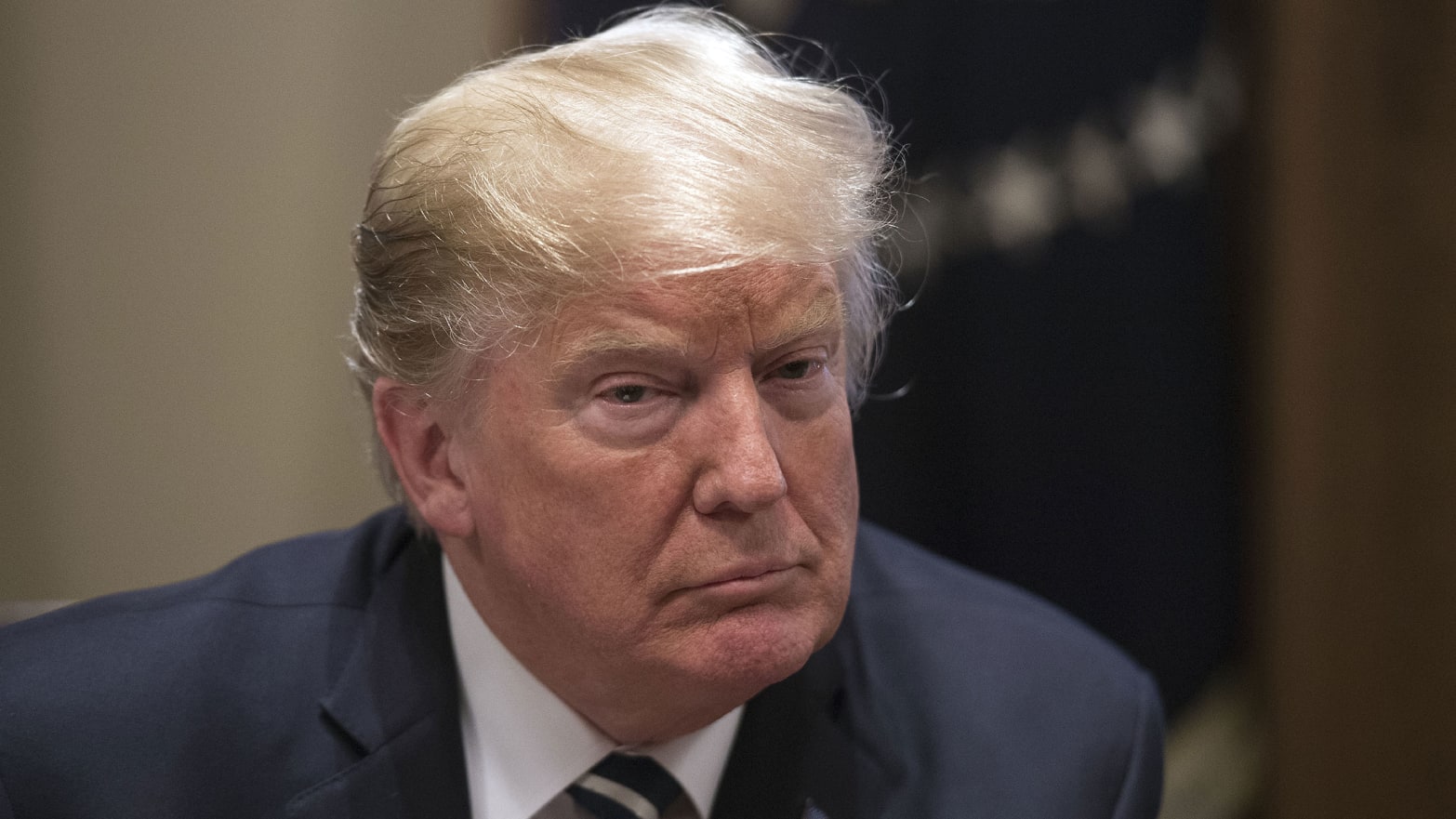With acts of commission, omission and confusion, Donald Trump has done a lot over the last few weeks to undermine the credibility and strength of the United States in the face of Russian aggression. While U.S. intelligence services unanimously assert Russian President Vladimir Putin is waging cyber war on American democracy, and last week’s indictments show precisely who and how, Trump gave Putin a pass at Helsinki. Since then, Trump has flip-flopped like a fat goldfish tossed on the floor. And most recently, the White House has allowed the possibility a former American ambassador to Moscow could be interrogated by Russian investigators.
Trump has labeled the most faithful allies of the United States as “foes,” and repeatedly attempted to undermine what’s left of European unity. Occasionally he backtracks a little bit, perhaps claiming he did not say or mean to say what he said. But the trend lines are clear.
None of his remarks are so dangerous, however, as the way he’s called into question the most fundamental aspect of NATO, the North Atlantic Treaty Organization, which is “collective defense.” As a result, America’s European allies are losing confidence in the United States' willingness to help defend them from the increasingly confident, assertive and aggressive regime of Russian President Vladimir Putin.
In an interview with Fox News host Tucker Carlson on Tuesday, Trump specifically cast doubt on America's obligation under the NATO charter to aid Montenegro, the newest of NATO's 29 member states, should Montenegro somehow start a global war.
A small country on the Adriatic coast with a population of just 700,000 people, Montenegro gained full independence from Serbia in 2006 and joined NATO in 2017. In 2016, Montenegrin authorities broke up a plot by pro-Russian mercenaries to kill the country's prime minister and install a new government.
"Montenegro is a tiny country with very strong people," Trump said. "They have very aggressive people. They may get aggressive, and congratulations, you’re in World War III."
Trump was referring to Article 5 of NATO's 1949 charter: "The parties agree that an armed attack against one or more of them in Europe or North America shall be considered an attack against them all," the article reads.
Trump appears to believe, mistakenly, that Article 5 would require NATO to participate should Montenegro's 2,000-person army attack, say, Serbia, a country with historic ties to Russia.
In fact, Article 5 is a defensive principle, as Article 6 of the charter explains. NATO must mobilize in the event "an armed attack on the territory of any of the parties" or on member states' forces in Europe or North America, according to Article 6.
NATO has deployed forces under Article 5 just once in the alliance's 69-year history. That was in the immediate aftermath of the 9/11 terror attacks, when NATO immediately sent alliance-owned radar planes to the continental United States in order to bolster U.S. air patrols. Subsequently NATO has played a major role in Afghanistan, supporting U.S. efforts to eliminate the terrorist threat and stabilize the country.
In casting America's treaty obligation to Montenegro as a threat to world security, Trump continued a line of attack on NATO that began as early as January 2017, when the then-president-elect called the alliance "obsolete" because it "was designed many, many years ago" in 1949.
But experts say a strong NATO prevents war by making an attack on any member state prohibitively costly, and helps to slow the spread of atomic weapons by extending the U.S., British and French nuclear deterrents to allied countries, who are then under less pressure to acquire nukes of their own.
The NATO states with the most to fear from Russia are Estonia, Latvia and Lithuania on the Baltic Sea, which were taken over by the Soviet Union as part of a deal between Stalin and Germany’s Adolf Hitler as they divided up territories at the beginning of World War II. (As anyone in Helsinki would tell you, the Russians also annexed part of their country after the Winter War of 1939-1940.)
Putin’s transparent ambition is to restore the supposed glories and much of the territory of the old Russian Empire and, indeed, the Soviet Union. To that end, where the Soviets left behind large Russian-speaking populations, he has sowed unrest, supporting separatist movements and waging war, whether overt or covert, to support them in the Republic of Georgia and Ukraine. Not the least of his reasons for such aggression has been to prevent those countries, which have observer status with NATO, from becoming full members with full protection under Article 5. And to that end, his policies have been successful.
At a press conference with Baltic leaders in April, Trump was asked by an Estonian journalist, “How are you going to deal with President Vladimir Putin? Is he... as your enemy or as someone you can have dialogue with?” Trump’s reply reiterated a couple of times was, “Nobody has been tougher on Russia than I have.” But this was said amid a muddle of remarks about energy supplies and accusations that other NATO members were not really so firm in dealing with Moscow. In fact, the statements were a foretaste of Trump’s insulting attack on German Chancellor Angela Merkel at the NATO summit on July 11 asking why Germany should be defended if it was buying most of its natural gas from Russia.
If NATO’s current and prospective members were nervous before the Helsinki summit, their reaction since ranges from bitter cynicism — they’ve learned what to expect from Trump — to barely restrained panic.
The Estonian daily Eesti Päevaleht wrote in an editorial, “'First and foremost, developments show just how much Mr. Trump's unpredictable behavior has undermined the credibility of the U.S., supposedly the bedrock of the western world, internationally.'' But it noted that the chemistry between Trump and Putin wasn't so good that Europe would be sacrificed on the altar of the partnership.
In Ukraine, where the Russian-backed separatist war has killed more than 10,000 people since it started alongside Putin’s annexation of Crimea, sentiments are especially bitter.
Natalia Antonova reports in a Guardian op-ed that “Our dead boys are nothing to Trump” is a common refrain in Ukraine since Helsinki.
Along with the Baltics, although much less frequently noted, the Balkans are a particularly vulnerable to Putin’s meddling and potential covert aggression, which is why Trump’s remarks about Montenegro are especially interesting, and of such concern.
Without NATO to keep the peace in southeastern Europe, open conflict and U.S. military intervention in the region becomes more likely, according to Damon Wilson, the executive vice president of the Atlantic Council.
In the 1990s, ethnic and religious factions within the former Yugoslavia fought a bloody series of wars. NATO and the United States intervened twice — in Bosnia starting in 1992 and Kosovo in 1999. The modern states of Montenegro, Serbia, Slovenia, Macedonia, Kosovo and Bosnia and Herzegovina were formed in the fragile peace. Montenegro, Croatia and Slovenia (where Melania Trump was born and grew up) are NATO members.
"This is the biggest benefit the United States gets from bringing Montenegro into the family—the promise that the United States will never again have to intervene to stop a regional conflict in the Balkans," Wilson wrote. "Given where the region was just two decades ago, this is a tremendous achievement."
"Trump's comments weaken NATO, give Russia a license to cause trouble and thereby actually increase the risks of renewed conflict in the Balkans," tweeted Wes Clark, a former U.S. Army general who was NATO's top officer from 1997 to 2000.
Trump's criticism of collective defense dovetails with his criticism of NATO members for, he alleges, spending too little on their militaries.
At a summit with NATO leaders in Brussels in early July, Trump demanded that alliance states increase their military spending to four percent of GDP to roughly match what the United States spends. "We are the schmucks who pay for the whole thing," Trump said of NATO at a rally in Montana before the Brussels summit.
In fact, the United States devoted just $31 billion of its $603-billion military budget for 2017 to European security, according to the International Institute for Strategic Studies. In total, non-U.S. NATO countries spent $239 billion on defense in 2017, IISS reported.
Critics have questioned the role that Trump's personal sympathy toward Putin plays in Trump's attacks on NATO in general and Montenegro in particular. After the Brussels summit, when Trump met Putin in Helsinki, talking one-on-one for more than two hours, the U.S. president openly challenged the consensus among U.S. intelligence agencies that Russia interfered in the 2016 U.S. presidential election.
In casting doubt on America's willingness to defend Montenegro, Trump boosts Russia's strategy in the region. "Russia vocally has opposed the expansion of Euro-Atlantic institutions into the Balkans, which it perceives as part of its sphere of influence," Reuf Bajrović, Vesko Garčević and Richard Kraemer wrote in a July report for the U.S. Foreign Policy Research Institute.
Trump's favoritism toward Russia over NATO and its most vulnerable members puts the president at odds with key members of his own party and administration. "By attacking Montenegro and questioning our obligations under NATO, the president is playing right into Putin’s hands," Sen. John McCain, an Arizona Republican, tweeted in response to Trump's Fox News comments.
As recently as February, Defense Secretary James Mattis praised Montenegro for resisting Russia aggression. "The United States is proud to call you our ally as we stand shoulder to shoulder alongside our fellow NATO members against common security threats," Mattis told the Montenegrin defense minister.
Trump's words undermine Mattis's reassurance, and could compel European leaders to reconsider their approach to collective defense. "We can no longer completely rely on the White House," German foreign minister Heiko Maas told the Funke newspaper group on Monday. "To maintain our partnership with the USA, we must re-adjust it. The first clear consequence can only be that we need to align ourselves even more closely in Europe."
Ultimately, Trump's attacks on NATO could end up isolating and weakening the United States, warned Donald Tusk, president of the E.U.'s European Council. "Dear America, appreciate your allies, after all you don’t have that many,” Tusk said in late June after signing a statement reaffirming cooperation between the E.U. and NATO.


